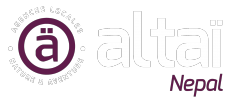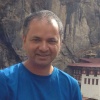Annapurna Circuit in 2 weeks
Itinerary
-
Day 1 Kathmandu
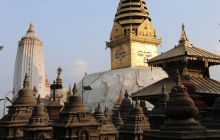 Welcome to Kathmandu! Your guide will greet you and escort you to your hotel. Depending on your arrival time, perhaps your trip leader can show you the old streets of Ason Tole and Indra Chowk and introduce you to the Nepalese way of living.
Welcome to Kathmandu! Your guide will greet you and escort you to your hotel. Depending on your arrival time, perhaps your trip leader can show you the old streets of Ason Tole and Indra Chowk and introduce you to the Nepalese way of living.
Accommodation: Hotel
-
Day 2 Route: Kathmandu - Jagat (1120m)
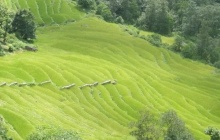 Early morning departure by minibus to the village of Besishahar (850 m) where we meet our porters. Then we continue by car to Jagat, the starting point of our trek. Todays' long journey is rewarded upon arrival with the magnificent setting of the Annapurnas Massif...
Early morning departure by minibus to the village of Besishahar (850 m) where we meet our porters. Then we continue by car to Jagat, the starting point of our trek. Todays' long journey is rewarded upon arrival with the magnificent setting of the Annapurnas Massif...
Transport: 7 hours
Accommodation: Lodge -
Day 3 Jagat - Dharapani (1975m)
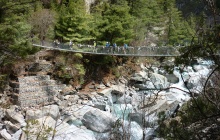 Today we follow the Marsyangdi River; ascend to Chamje, then climb 300 m up to the village of Tal, in an old lake with a large waterfall. This afternoon we continue gently down to Dharapani, a beautiful village at the confluence of two rivers.
Today we follow the Marsyangdi River; ascend to Chamje, then climb 300 m up to the village of Tal, in an old lake with a large waterfall. This afternoon we continue gently down to Dharapani, a beautiful village at the confluence of two rivers.
Trek: 7 hours
Ascent/descent: +1000m/-450m
Accommodation: Lodge -
Day 4 Dharapani - Chame (2715m)
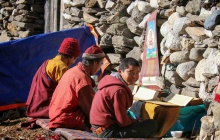 It is a steep climb to Timang the High through a beautiful pine forest. From Koto, we have a remarkable view of Annapurna II and Manaslu. At Chame, we enter the Buddhist country: chortens, manis walls and the prayer flags decorate our route.
It is a steep climb to Timang the High through a beautiful pine forest. From Koto, we have a remarkable view of Annapurna II and Manaslu. At Chame, we enter the Buddhist country: chortens, manis walls and the prayer flags decorate our route.
Trek: 6 hours
Ascent/descent: +980m/-240m
Accommodation: Lodge -
Day 5 Chame - Pisang (3314m)
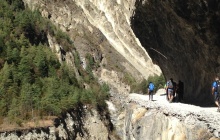 As we progress, the landscapes become more arid and fewer crops persist. Today we cross several Gurung villages and lovely views of the Himalayan mountain chain spanning from Manaslu to Annapurna II await. This afternoon, we visit the beautiful village and monastery of Upper Pisang.
As we progress, the landscapes become more arid and fewer crops persist. Today we cross several Gurung villages and lovely views of the Himalayan mountain chain spanning from Manaslu to Annapurna II await. This afternoon, we visit the beautiful village and monastery of Upper Pisang.
Trek: 5 - 6 hours
Ascent: +830m/-360m
Accommodation: Lodge -
Day 6 Pisang - Manang (3550m)
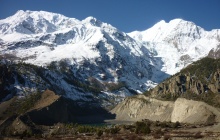 Our journey continues to Manang, with a viewpoint displaying a number of mythical Himalayan summits: Annapurnas IV, II, III, Gangapurna ... An exceptional setting! Depending on the conditions and group motivation we can pass through the old villages of Ghyaru and Ngawal along a beautiful balcony trail (+ 1 hour of walking).
Our journey continues to Manang, with a viewpoint displaying a number of mythical Himalayan summits: Annapurnas IV, II, III, Gangapurna ... An exceptional setting! Depending on the conditions and group motivation we can pass through the old villages of Ghyaru and Ngawal along a beautiful balcony trail (+ 1 hour of walking).
Trek: 6 - 7 hours
Ascent/descent: +400m/-100m
Accommodation: Lodge -
Day 7 Manang: Acclimatization/Rest day
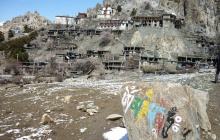 A relaxed day dedicated to acclimatization in Manang. Important to optimize our success of the Thorong La passage. Several full/half-day excursion options possible to further explore the village and area.
A relaxed day dedicated to acclimatization in Manang. Important to optimize our success of the Thorong La passage. Several full/half-day excursion options possible to further explore the village and area.
Accommodation: Lodge
-
Day 8 Manang - Yak Kharka (4220m)
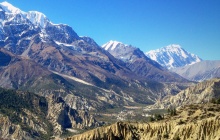 This short easy leg enables regular acclimatization to the altitude. We leave the banks of the river Marsyangdi and begin the gently climb up to the pasture of Yak Kharkha. Afternoon at leisure to relax or enjoy a pleasant stroll.
This short easy leg enables regular acclimatization to the altitude. We leave the banks of the river Marsyangdi and begin the gently climb up to the pasture of Yak Kharkha. Afternoon at leisure to relax or enjoy a pleasant stroll.
Trek: 4 hours
Ascent/descent: +730m/-50m
Accommodation : Lodge -
Day 9 Yak Kharka - Thorong Phedi (4624m)
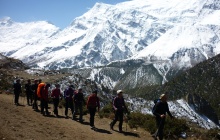 It is a short walk to Thorong Phedi. Our path travels through yak pastures and alternates between ascending and descending sections. We are slowly advancing towards the bottom of the valley to save our breath. This afternoon, an additional acclimatization hike to Thorong Phedi base camp is possible (+ 400m and 400m return hike).
It is a short walk to Thorong Phedi. Our path travels through yak pastures and alternates between ascending and descending sections. We are slowly advancing towards the bottom of the valley to save our breath. This afternoon, an additional acclimatization hike to Thorong Phedi base camp is possible (+ 400m and 400m return hike).
Trek: 3 - 4 hours
Ascent/descent: +1030m/-550m
Accommodation: Lodge -
Day 10 Thorong Phedi - Thorong La (5416m) - Muktinath (3802m)
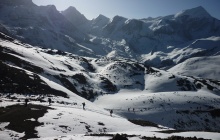 Departure in the very early morning for the Thorong Pass, the highest point of our trek. Fantastic panorama views reward our effort. After a tea and photo break at the pass, we start the steep descent to Muktinath, the first Mustang village and religious sanctuary for Buddhists and Hindus. Visit the small temple of Muktinath.
Departure in the very early morning for the Thorong Pass, the highest point of our trek. Fantastic panorama views reward our effort. After a tea and photo break at the pass, we start the steep descent to Muktinath, the first Mustang village and religious sanctuary for Buddhists and Hindus. Visit the small temple of Muktinath.
Trek: 7 - 8 hours
Ascent/descent: +940m/-1620m
Accommodation: Lodge -
Day 11 Muktinath - Lupra - Jomsom (2700m)
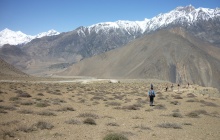 We leave Muktinath, cross an easy pass and continue our trek through beautiful alpine and arid landscapes. On the way, if luck is with us, we may see the himalayan bharal or 'blue sheep'. A relatively steep descent leads us to Lupra, a quiant village hidden by the gorges of the Lupra Khola. Far from the frequented trekking trails, Lupra has managed to preserve its charm. After a soothing stop in this calm village, we head towards the windy Kali Gandaki valley and Jomsom.
We leave Muktinath, cross an easy pass and continue our trek through beautiful alpine and arid landscapes. On the way, if luck is with us, we may see the himalayan bharal or 'blue sheep'. A relatively steep descent leads us to Lupra, a quiant village hidden by the gorges of the Lupra Khola. Far from the frequented trekking trails, Lupra has managed to preserve its charm. After a soothing stop in this calm village, we head towards the windy Kali Gandaki valley and Jomsom.
Trek: 5 to 6 hours
Ascent/descent: +100m/-1200m
Accommodation: Lodge -
Day 12 Flight Jomsom – Pokhara
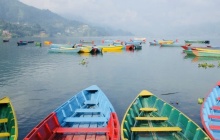 Early morning flight from Jomsom to Pokhara, a lovely journey above the Kali Gandaki, the deepest canyon in the world, flanked by the Annapurna and Dhaulagiri massifs. Lunch and then an afternoon at leisure in Pokhara.
Early morning flight from Jomsom to Pokhara, a lovely journey above the Kali Gandaki, the deepest canyon in the world, flanked by the Annapurna and Dhaulagiri massifs. Lunch and then an afternoon at leisure in Pokhara.
Accommodation: Hotel
-
Day 13 Drive: Pokhara – Kathmandu
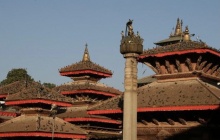 After breakfast, we take the road from Pokhara to Kathmandu through a vast stretch of Nepalese countryside. Upon arrival in Kathmandu, we visit the famous Swayambhunath Buddhist stupa. Also known as 'the monkey temple', it sits perched on a hill overlooking the sprawling valley of Kathmandu. Afternoon at leisure, why not take a stroll through the pedestrian district of Thamel?
After breakfast, we take the road from Pokhara to Kathmandu through a vast stretch of Nepalese countryside. Upon arrival in Kathmandu, we visit the famous Swayambhunath Buddhist stupa. Also known as 'the monkey temple', it sits perched on a hill overlooking the sprawling valley of Kathmandu. Afternoon at leisure, why not take a stroll through the pedestrian district of Thamel?
Accommodation: Hotel
Dinner not included -
Day 14 End of stay
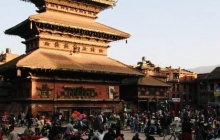 Depending on your departure time, you can organize a day exploring the jewels of the Kathmandu Valley: Bhaktapur, a pedestrian city located 15 km from Kathmandu. It is the most beautiful of the three imperial cities of the valley; Pashupatinath, Hindu site dating from the twelfth century, a cremation site dedicated to Shiva where pilgrims come to bathe in the sacred Bagmati River; the great stupa of Bodhnath located in the heart of the Tibetan quarter where many monasteries of exile were built. At the end of the day, hundreds of Buddhist enthusiasts come to visit this sacred place. It's a moment that is lived. There is a unique atmosphere! Contact us for more options and ideas.
Depending on your departure time, you can organize a day exploring the jewels of the Kathmandu Valley: Bhaktapur, a pedestrian city located 15 km from Kathmandu. It is the most beautiful of the three imperial cities of the valley; Pashupatinath, Hindu site dating from the twelfth century, a cremation site dedicated to Shiva where pilgrims come to bathe in the sacred Bagmati River; the great stupa of Bodhnath located in the heart of the Tibetan quarter where many monasteries of exile were built. At the end of the day, hundreds of Buddhist enthusiasts come to visit this sacred place. It's a moment that is lived. There is a unique atmosphere! Contact us for more options and ideas.
Dates & prices
International departures:
No departure for now
Trip code: NEPANEX-EN
Included
- All in-country transfers by private vehicle as detailed in itinerary
- Accommodation in 3 * hotel or B&B in Kathmandu (Hotel Tibet, Manaslu or similar)
- Accommodation in a 2 * hotel in Pokhara (Hotel Lake View or similar)
- Trek includes full-board and lodging
- Full accompaniment by an English speaking Altaï Guide
- Visits as per itinerary: with a cultural guide in a private vehicle
- Luggage transport - up to 12kg maximum per person during the trek
- Trekking support team: assistants and porters
- Trekking permits: ACAP and TIMS
- Staff Insurance
- All local taxes
Not included
- Entrance to historical sites & monuments
- Meals in Kathmandu - Lunch Day 1 & Dinner Day 13
- Nepalese visa: US $ 25
- International flights
- Insurance: Repatriation, Medical & Helicopter Services
- Drinks, tips and personal expenses - all that is not in "THE PRICE INCLUDES"
Notes
Level 4/5
Terms and conditions
Booking conditions
Invoice procedure
Cancellation policy
- Cancellation received more than 30 days prior to the departure date: a sum of €50 per person will be retained
- Cancellation received 30 to 21 days before the departure date: your deposit, 30% of the total trip price will be retained
- Cancellation received 20 to 14 days before the departure date: 50% of the total trip price will be retained
- Cancellation received 13 to 7 days before the departure date: 75% of the total trip price will be retained
- Cancellation received less than 7 days before the departure date: 100% of the total trip price will be retained
- Fixed airfares: if your airline ticket was issued in advance, often done to avoid significant surcharges, you will be charged 100% of any non-refundable fees if you wish to change or cancel your flight plan.
- Fixed in-country costs: early charges for firm bookings will be charged if you cancel or modify your trip.
- Insurance costs: if you have taken out comprehensive or cancellation insurance, the cost of insurance is due and cannot be refunded.
Changes to travel contract
Pricing
Contract transfer
Insurance
Practical info
Staff
Food
Accommodation
Transportation
Budget & exchange
Tips
Vital equipment
- Warm Sleeping Bag
- Water purifiers (micropur, aguatabs ...)
- A cap or sunhat
- 1 or 2 sets of thermals: long-sleeved thermal tops and full-length long johns
- Long sleeved and short sleeved t-shirts, preferably in quick-drying technical material
- A light fleece or equivilent (plus extra warm layers if necessary)
- A breathable wind proof, waterproof jacket (Gore-Tex...)
- Lightweight waterproof over trousers
- Suitable shorts
- Walking trousers
- A pair of high-rise walking boots - strength, good grip of the foot and ankle (high stems) and impermeability are essential. Choose shoes with non-slip soles (vibram).
- A pair of trainers/sandels or equivilent casual shoes for cities, villages and evenings
- Thick walking socks
- Warm gloves, hat and scarf (it can be chilly in the mountains)
Material
- No cotton
- Always carry dry spares of everything, including underwear and gloves
- A warm breathable base layer
- A second thermal layer
- Wind and water proof protective outer layers
Luggage
- A rucksack (35-40L or 45-50L) for use as a day bag. This will contain your (vital) personal belongings for the day (sweater, spare t-shirt, water bottle, picnic-lunch, sunglasses, small things ... )
- We use porters to transport our other belongings when trekking. Please bring a flexible travel bag with zips for easy access max 80L and max 13kg (16kg with camping gear). Please do not bring suitcases or other hard bags which the porters cannot transport.
- You may also be able to store some belongings securely at the hotel in Kathmandu.

